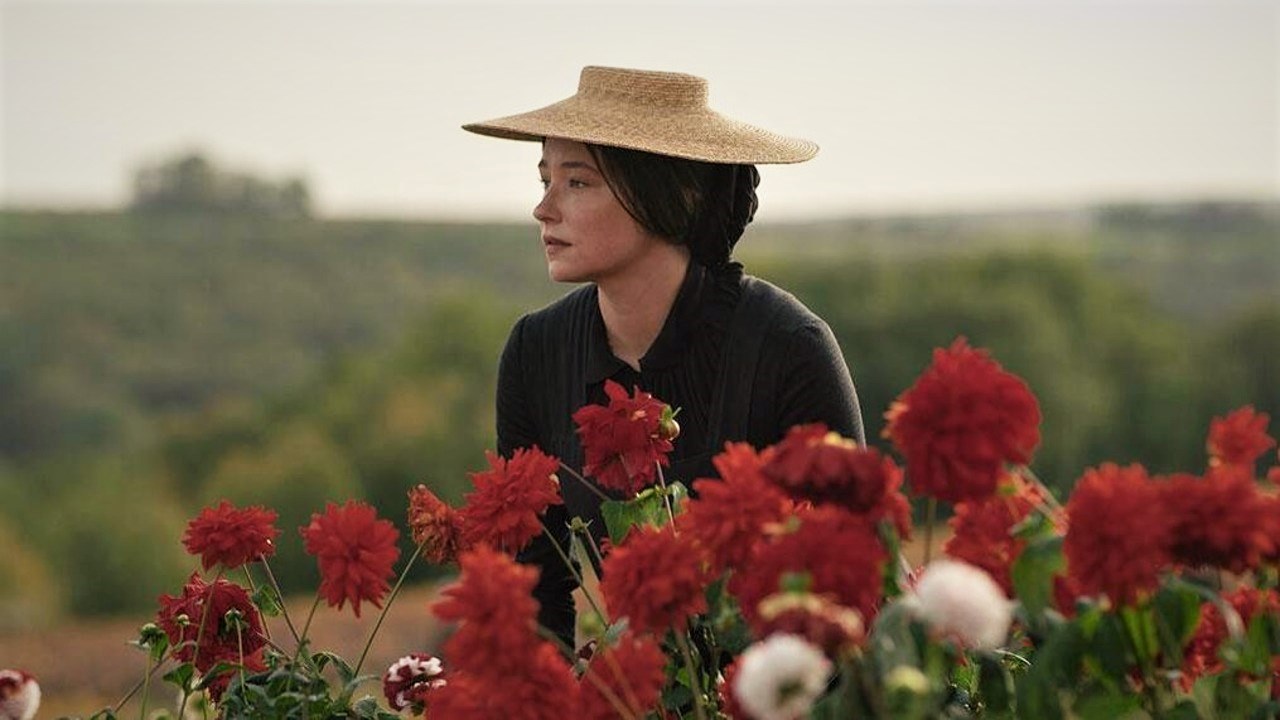
Madame Clicquot Ponsardin became a French Champagne producer after taking on her husband's wine business when she was widowed at 27. Under her direction, the company invented a novel technique called riddling for champagne development. In this process, the sediment is loosened so that it collects in the bottleneck. How exactly did Clicquot come up with such a method? Thomas Napper's drama isn't interested in answering this question. The director reduces Clicquot's efforts and experiments into a series of bland images that merely depict the character mixing liquids in a container. What did she think while doing these experiments? Napper offers us soppy words ("I want our champagne to have structure, depth. It must reflect your elegance"). He gives us poetic lines and poetic visuals that support the melancholic mood of Widow Clicquot. Everything feels fragile and soft. Caroline Champetier's cinematography, in some scenes, seems to be inspired by the painting of Madame Clicquot Ponsardin, which is available on Wikipedia. The images have a similar delicate yellow glow. Richard Marizy's brisk editing renders every scene ephemeral. This expression of the evanescence of beauty is matched with a story that deals with an unfulfilled, tragic romance. Clicquot's (Haley Bennett) relationship with her husband, François (Tom Sturridge), becomes rough when his wine business suffers major losses. Later, Clicquot is unable to act on her love for François's friend and her wine merchant, Louis Bohne (Sam Riley), and a text informs us that Clicquot never married again after her husband's death.
Napper's film, based on Tilar J. Mazzeo's book The Widow Clicquot, has nothing significant to say about its subject. Her journey is given the usual women-fighting-patriarchal-world treatment, and even in this respect, all it can offer us is those clichés along the lines of "women should do household chores, not run a business." These dumb remarks come from cartoon villains, who first challenge Clicquot's decisions and then hit her with a court order. But at least you respond with a yawn to these declarations. There is a reaction from the audience. As far as other scenes are concerned, they fail to move us. We never get hold of the intense romance at the center, and the plans regarding the sale of the wines and their production are casually dispensed as if the details don't matter. Clicquot's identity and greatness are linked to the ingenuity and hard work she brought to her profession, but the film treats her work with indifference. It remains content with the protagonist's achievements, which is why it never dives into her mind or her methods. Instead, it offers us schmaltzy voiceovers and ruminations. Widow Clicquot refuses to let us participate in Clicquot's highs and lows. Her champagne is spoiled on its way to Amsterdam, and she tells Philippe (Ben Miles) about the spoiled, missing product, leading to a (very brief) heated confrontation, and, at one point, war threatens to destroy the vineyard. These moments, however, come and go like mere footnotes. The movie moves so quickly towards its destination that you don't get the chance to feel the weight of these events.
One suspects that Napper might have made this film to just create beautiful images. The cork of the wine bottles hit each other like bullets. When Clicquot runs towards a house to stay safe from the soldiers, we notice fire explosions in the distance. When Clicquot removes her clothes before Louis, we see her reflection in the mirror. Widow Clicquot is like a slideshow of pretty pictures. These pictures, unfortunately, convey very little substance. Napper wraps his film with a gloomy, nostalgic cover that neuters other emotions, like love and happiness. We never even feel the pain of the characters because this nostalgic tone gives the movie the appearance of a distant memory, so while watching it, we feel as if we are going through a stranger's photo album. Napper admires Clicquot from a distance and never manages to convince us about her greatness. She remains a hazy figure of female rebellion. Napper's lack of imagination can also be found in his creation of François, who appears to be a clichéd version of the type of artist who suffers and tortures himself. When Clicquot gives a rousing, sentimental speech in the court, the camera slowly moves towards her and says, "Pay attention." What this tells you is that the pretty pictures are trapped in a style that can be conventional. Is Widow Clicquot a tragic love story? Yes. Is it about the obstacles faced by a businesswoman? Yes. Does Napper manage to strike a balance between the two threads? No.
Final Score- [4.5/10]
Reviewed by - Vikas Yadav
Follow @vikasonorous on Twitter
Publisher at Midgard Times
Hi Everyone, after a due consideration, we have decided that we will be open for donations to help us in managing our website. We will be greatful for any kind of amount we receive. Thanks!
— Midgard Times 🎬 (@Moviesr_net) January 4, 2026
PayPal- [email protected] pic.twitter.com/DlNNz5Npm5
Get all latest content delivered to your email a few times a month.
Bringing Pop Culture News from Every Realm, Get All the Latest Movie, TV News, Reviews & Trailers
Got Any questions? Drop an email to [email protected]